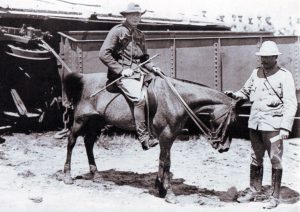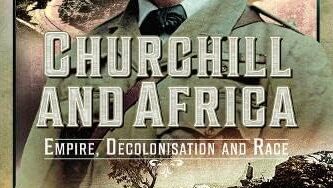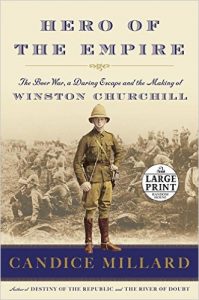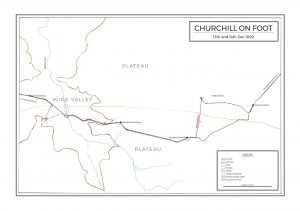
Bulletin #185 — Oct 2023
Churchill and Africa

To view in full, right click and choose "View Image"
September 23, 2023
The Full African Journey
C. Brad Faught, Churchill and Africa: Empire, Decolonisation and Race, Pen and Sword, 2023, 187 pages, £20 / $39.95. ISBN 978–1526768544
Review by David Freeman
Canadian historian C. Brad Faught sets out “to show that [Winston] Churchill’s knowledge and understanding of Africa and Africans was more nuanced and of greater sophistication than is often believed.” By the end of the book, he largely succeeds in proving that “throughout much of Churchill’s long political career his view of what used to be called ‘Black Africa’ was relatively enlightened.” The only real problem with this book is that there is too much chaff before you get to the wheat, but the grist is worth the grind.
This short study consists of eight chapters. Only the last four are worth reading for those already familiar with Churchill’s life and career. The first is an overview of Churchill’s early life followed by chapters dealing specifically with his experiences in 1) Sudan during the River War, 2) South Africa during the Boer War, and 3) East Africa during the 1907–08 travels Churchill chronicled in My African Journey. These episodes have been well documented starting with Churchill himself and followed by scores of biographies and specialized studies. In these areas, Faught’s text is plain boilerplate.

2024 International Churchill Conference
Where Faught breaks new ground, however, and really grabs the reader’s attention are—counterintuitively—in the chapters about Churchill’s involvement with sub-Saharan Africa entirely from a distance, first when he was Colonial Secretary in the early 1920s, and then when he was Prime Minister, both during the Second World War and, later, during his peacetime premiership in the 1950s. Faught accomplishes this by examining aspects of Churchill’s time in these great offices of state that have been overshadowed by larger events that have claimed the lion’s share of historical attention.
During his time as Secretary of State for the Colonies, Churchill focused primarily on working to bring peaceful settlements to Ireland and the Middle East. No small tasks those, and they have been much studied ever since. Faught rightly shows, however, that Churchill did not neglect the rest of the Empire including Africa. Although Churchill never returned to sub-Saharan Africa following his 1907–08 tour, when he was the Under Secretary of the Colonies, he did not forget what he viewed as the arrogance and selfish posturing of the white settler communities in Britain’s African territories.
“To be sure,” as Faught puts it, “Churchill’s view [of native Africans] was paternalistic. But it was not retrograde.” Churchill took the view that the British Empire had a serious responsibility to nurture native peoples, never exploiting them, until such time as they were prepared for self-government. “‘It is, after all, their Africa,’ he insisted.” As Colonial Under Secretary in the Edwardian era, Churchill denounced the barbaric use of Chinese indentured labor in South Africa and the butchering of Zulus by the government of Natal.
As Colonial Secretary in the 1920s, Churchill tried to stop the government of Kenya from continuing with a program that used natives as forced labor. Churchill’s efforts had only limited success, but he inspired Kenyan nationalist Harry Thuku, who recorded in his memoirs nearly fifty years later a protest he made to colonial police overseeing women and girls being made to cut reed stalks: “Don’t you know that forced labor of this sort has been stopped by order of Winston Churchill of the Colonial Office?”
As Prime Minister during the Second World War, Churchill naturally focused primarily on the Mediterranean shoreline of Africa and points north. Consequently, few people have taken notice of a notable success that the British had in East Africa in the first half of 1941, well before either the Soviet Union or the United States entered the war. In February, Brigadier Orde Wingate’s “Gideon Force” and—even more importantly—two divisions of the Indian Army and a third force comprised of various African regiments began the process of driving the Italians from Abyssinia (modern Ethiopia). By 5 May, Emperor Hailie Salassie had been restored to power. “His Britannic Majesty’s Government have been proud to aid the Abyssinian people in driving out the invader and aggressor,” wrote Churchill.
Later that same year, Churchill helped to inspire many native peoples in Africa, even if it did require a good bit of arm twisting by President Franklin Roosevelt. The Atlantic Charter, issued in August, committed the Anglo-American alliance to the principle of self-determination. As a result, Faught writes, “both [Ghana’s] Kwame Nkrumah and [South Africa’s] Nelson Mandela would credit Churchill with heralding the dawn of a new era in world history.”
When Churchill became Prime Minister again in 1951, African nationalism was fast gaining momentum. Already, Nkrumah had become the leader of the Gold Coast’s [Ghana’s] colonial assembly in 1952 when Churchill’s Cabinet gave him permission to use the title “Prime Minister.” That same year, what has become known as the Mau Mau uprising erupted and became the dominant African issue with which Churchill had to contend during his second premiership.
Faught rightly shows that the prolonged crisis was drastically more complicated than many people now choose to understand. Many of the victims were Kikuyu brutally murdered–often assassinated—by other Kikuyu. The causes of the rebellion, however, unquestionably stemmed from the growing disparity in land distribution driven largely by the tiny community of white settlers, who proved to be deeply intransigent. Churchill consistently urged them to negotiate. Just as consistently, they alienated Churchill by refusing.
Churchill made two notable contributions to resolving the crisis. First, he replaced the local military commander with General Sir George Erskine, who shared Churchill’s antipathy to the white settlers. Erskine used harsh but effective tactics to gain some control over the situation. In so doing he may well have saved many lives. Churchill’s second contribution was to temper the retribution being carried out by Kenyan authorities against captured nationalist leaders. The Prime Minister undoubtedly recalled the Irish troubles when he successfully argued in Cabinet that the life of Wahuriu Itote (known as “General China”) be spared from capital punishment.
In his final chapter, Faught considers the present-day charge that Churchill was racist. “By the standards of today applied to him retrodictively, the answer is yes,” Faught begins, but “by the standards contemporaneous to when Churchill was alive, he should not be seen as a racist. At no time in his long connection with Africa can it be said that he held racist views of a remorseless, or programmatic, or murderous kind.” “Very clearly,” Faught concludes, Churchill “was a cradle British liberal imperialist who believed in Western-style economic, social, and political progress, and in the British Empire’s capacity and responsibility to deliver them.” Fought’s book is worth reading for his thoughtful analyses of extremely controversial topics.
David Freeman is editor of the Churchill Bulletin.
Subscribe
WANT MORE?
Get the Churchill Bulletin delivered to your inbox once a month.




